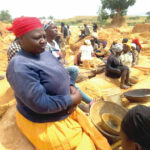Temilade Halimat Adekanmbi, an eventprenuer, is the managing director at Event affairs Nigeria and chief executive officer of an NGO; Survivor Empowerment and Counseling Centre. In this interview with YEJIDE GBENGA-OGUNDARE, she speaks on passion for helping the less privileged, affordability of fighting for justice, street children and women leadership among other issues.
You are known for taking up cases of the less privileged and downtrodden, what is your motivation?
Helping the less privileged is vital to strengthening the society, we raise the entire community as we provide support and a helping hand to those less fortunate than us. Helping them leads to a better life for themselves and their community later on in life.
How easy and affordable is the fight for justice?
It’s not really easy because of the kind of society we find ourselves, but with God all things are possible, meanwhile, we are only trying our best most especially because we do things within our capacity.
What challenges do you face?
We face interconnected challenges, most serious issues faced so far were funding, lack of productive resources to ensure sustainable livelihoods, accessing services and social discrimination to mention a few.
Why are there many helpless children on the streets?
Today in our society, we have lost value for so many things .
In the olden days, so many families would protect their family names and would always be proud of their heritage, but unfortunately we have adopted so many strange ways of life, especially from the west, which has really affected so many homes. Parents no longer see their children as priority, parenting has failed so many children, that is why you will see a teenager giving birth at a younger age, and then the parent thinks she should be responsible for her life, and then when she gets tired and can’t cope, she abandons the child to his or her fate in order to find a better life. From there, we have so many fatherless and motherless children on the street.
In some other cases, when some of these children lose their parents, the family abandons them to carry their crosses, and the society does not have provisions for such children anymore, that is why you see lots of them on the street seeking survival.
What are your thoughts on women having streams of income? It is important to have more than one stream of income, more income streams means more money, flexibility and freedom.
Diversifying your income and career so that you’re never left in the lurch if you lose a job as well as having multiple jobs and income sources, helps to develop skills and build your brand.
Can women be good leaders?
Yes. Women often excel at leadership roles largely due to the soft skills that they possess.
Women are great leaders because we are able to balance professional and personal leadership skills.
How can women prove their worth to be seen beyond cheer leaders and sex objects?
Women can prove their worth by excelling in their chosen fields and taking on leadership roles simply by showcasing their intelligence, skills and expertise. They can challenge societal stereotypes and demonstrate their value beyond being cheerleaders or sex objects. Additionally, promoting and supporting other women, advocating gender equality, and challenging discriminatory practices can help establish a more inclusive society where women are recognised for their talents and qualifications.
You are into politics, how is the terrain for women in Nigeria?
We are coming up. The political terrain for a woman in Nigeria can be challenging and complex. Nigeria is a patriarchal society where gender inequality and traditional gender roles prevail. Women are underrepresented in politics and face numerous obstacles and barriers to political participation and leadership.
Several factors contribute to the challenges faced by women in Nigerian politics; deep-rooted cultural beliefs often perpetuate stereotypes and prejudices against women, limiting their access to resources, opportunities and decision-making positions. Traditional norms and practices may restrict women’s freedom of expression and limit their mobility, affecting their ability to campaign and engage in political activities.
Violence and harassment against women in politics are also prevalent in Nigeria. Female political candidates and elected officials often face threats, intimidation, and violence, including sexual harassment or assault. This hostile environment can deter women from seeking political positions or actively participating in the political process.
Furthermore, women generally have limited access to political and financial networks, which are crucial for building relationships, mobilising support, and funding campaigns. Lack of adequate funding, party support and mentorship opportunities further hinder women’s political advancement. Despite these challenges, progress has been made in increasing women’s participation in politics in Nigeria. The country has implemented affirmative action policies, such as the National Gender Policy and the Gender and Equal Opportunities Bill, which aims to promote gender equality and increase women’s representation in public offices. Additionally, organisations and civil society groups are working towards improving women’s political empowerment and creating support networks for female politicians.
In conclusion, while the politics terrain for women in Nigeria presents numerous hurdles, efforts are being made to address gender disparities and promote women’s political participation. Nonetheless, substantial changes are still required to achieve true gender equality in Nigerian politics.
Do you think there’s a restriction on women in the professional circle in Nigeria?
Yes, there are often restrictions on women in the professional circle in Nigeria. While progress has been made in recent years, women still face gender-based discrimination and biases that limit their opportunities for professional growth and advancement. In many sectors, women may encounter barriers such as limited access to education and training, gender stereotypes and biases, unequal pay, lack of representation in leadership positions, and societal expectations of traditional gender roles. These restrictions can hinder women’s career progression and limit their overall participation and influence in the professional world. However, it is important to note that there are also many Nigerian women who have successfully broken through these restrictions and achieved notable success in various professional fields.
READ ALSO FROM NIGERIAN TRIBUNE






